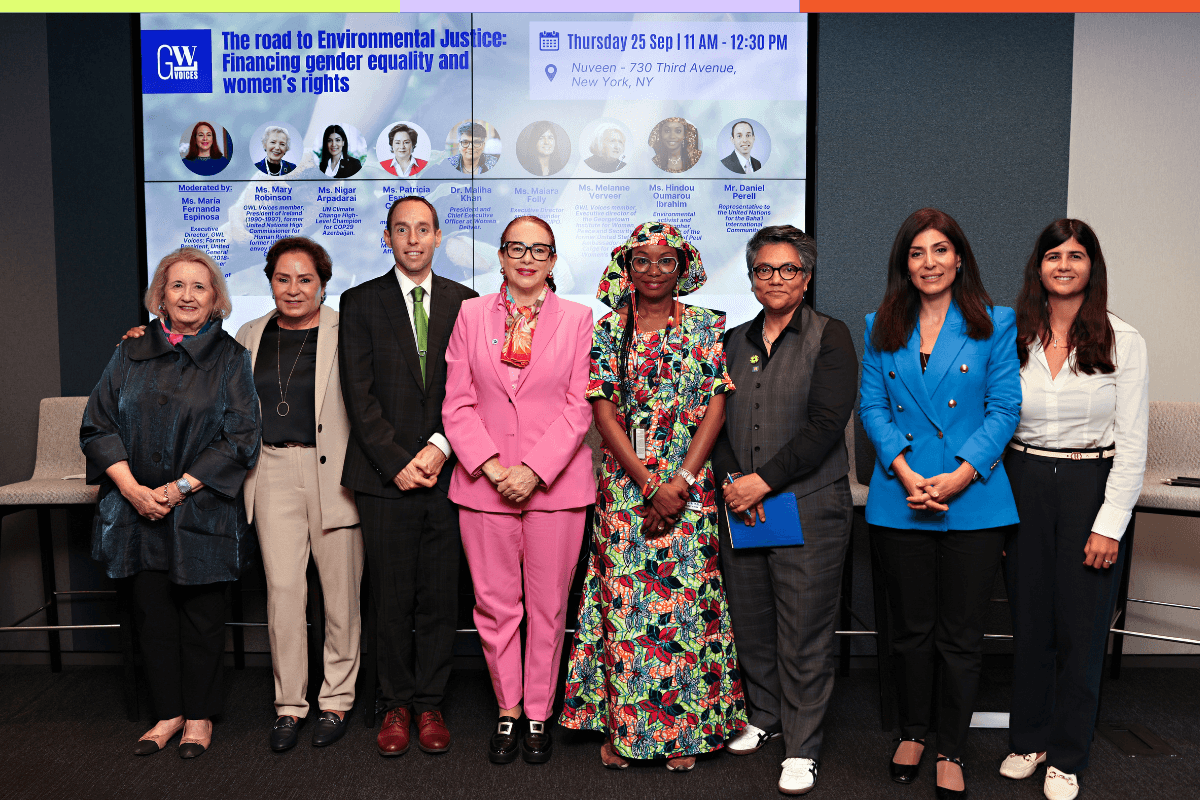Gender-Responsive Finance for Climate Justice: A Call to Bold Action at Climate Week NYC

Share
As part of Climate Week NYC, GWL Voices, Women Deliver, Plataforma CIPÓ, and the Bahá'í International Community convened a high-level dialogue on how gender-responsive finance can drive climate justice and advance women’s rights.
The discussion, moderated by GWL Voices Executive Director, Ms. María Fernanda Espinosa, brought together women leaders and allies from across sectors to highlight the disproportionate impacts of the climate crisis on women and girls, and the urgent need for structural change.
The urgency of action
Ms. Espinosa opened the dialogue with a stark reminder: “Climate change may push 240 million girls into full insecurity, compared to 131 million men and boys.” The gendered effects of water insecurity, health impacts, heat waves, and pollution demand targeted solutions. She stressed that the new gender action plan will remain words on paper unless grounded in “money, capacity, and technology.” Looking ahead, she delivered a firm call to action: “We need a COP30 for women, by women. We need more women leading the negotiations and raising their voices.”
The state of the planet
GWL Voices member and Chair of The Elders, Ms. Mary Robinson, warned that humanity is breaching planetary boundaries: “Oceans and coral reefs are at extreme risk.” She urged governments and financial institutions to “switch the money in a massive way, cut fossil fuels,” while lamenting that current leaders “are not in crisis mode” and are letting the climate and nature agenda slip. Yet she pointed to hope in young leaders and activists, who through social media can push governments to act: “We need leaders to feel the push.”
From frameworks to implementation
GWL Voices member and former UNFCCC Executive Secretary, Patricia Espinosa, cautioned that frameworks alone are not enough: “Inclusion does not happen automatically… all of that will not mean anything if we are not active in promoting its implementation and enforcement.” She emphasized the need for engagement at all levels—national, community, schools, and workplaces—and called for deeper conversations about the transition away from fossil fuels: “It’s becoming clear that it’s not a black and white scenario… we need oil and gas companies at the table to hold them accountable.”
A fragmented world, a united agenda
Ms. Nigar Arpadarai, UN Climate Change High-Level Champion for COP29, reminded participants of the global stakes: “We live in a fragmented world with an extreme number of conflicts. The climate agenda unites all of us.” She stressed the importance of universal rules, engaging both oil and gas companies and small enterprises, and exploring new tools like AI to accelerate solutions.
Women, peace, and security in a climate crisis
GWL Voices member and former U.S. Ambassador-at-Large for Global Women’s Issues, Ms. Melanne Verveer, highlighted the intersection of climate, peace, and security: “Displacement is creating enhanced competition for resources and that in itself is creating conflict. Climate is now a security issue.” She urged for a global movement: “We’ve got to get ourselves into a spirit of movement that brings together big numbers of women and people.”
The invisible impacts
Ms. Maliha Khan, President & CEO of Women Deliver, centered the lived realities of women and adolescent girls in vulnerable regions: “What doesn’t make the headlines are incredible stress heat waves in Pakistan, temperatures reaching over 50 degrees for months.” She explained that “women and girls’ bodies carry the burden of the climate crisis” as they sacrifice autonomy and education to care for families. “Resilience stops at the household level,” she noted, stressing that the situation of a young, disadvantaged, uneducated girl going through teen pregnancy and carrying the unpaid care burden of her household is not differentiated from the resilience level of the educated, employed and empowered male head of household. She also noted that adolescence often determines the trajectory of girls’ futures.
Truth, courage, and representation
Speakers called for greater ambition in the upcoming COP negotiations. Ms. Maiara Folly of Plataforma CIPÓ said: “We need COP30 to be the COP of truth—the moment to ask leaders whether they have the courage to implement what they’ve agreed to.” She urged for stronger representation, noting that only 38% of participants at the last COP were women and just 32% were heads of delegations.
Ms. Hindou Oumarou Ibrahim, Coordinator of the Association of Peul Women and Autochthonous Peoples of Chad (AFPAT), underscored the wisdom of traditional knowledge and the urgency of women’s leadership: “We need women leadership—men are not ready to give it to us, so we need to grab it. Every woman needs to stand up and back another woman. You don’t like us? Create a new planet.”
Reimagining leadership
The discussion closed with a reflection from Daniel Perell of the Bahá'í International Community: qualities such as humility and empathy—often dismissed as vulnerability—are precisely what must be brought into climate negotiations.
The message from GWL Voices and Women Deliver Climate Week NYC event is clear: the fight for climate justice is inseparable from the fight for women and girls leadership and representation. The world needs women not only at the table but at the helm—shaping solutions, leading negotiations, and ensuring finance works for those most affected.